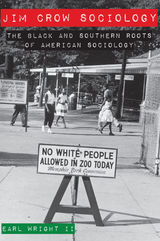3 start with J start with J

Guided by this approach, this book debunks the idea that the sociology practiced by early African Americans does not exemplify scholarly excellence. Instead, Earl Wright demonstrates that Tuskegee Institute, under the leadership of Booker T. Washington, established the first applied program of rural sociology. Fisk University, first under the guidance of George Edmund Haynes then Charles S. Johnson, developed one of the earliest and most impactful programs of applied urban sociology. Wright extends our understanding of W. E. B. Du Bois’s Atlanta Sociological Laboratory with an articulation of the contributions of women to the first American school of sociology. Jim Crow Sociology forces contemporary scholars to grapple with who are and who are not included in the disciplinary canon. Specifically, this book forces us to ask why early African American sociologists and HBCUs are not canonized. What makes this book most consequential is that it provides evidence supporting the proposition that sociology began in earnest in the United States as a Black and southern enterprise.

2023 Peggy O'Brien Book Prize, winner
Across all imaginable borders, Johnny Cash fans show the appeal of a thoroughly American performer who simultaneously inspires people worldwide. A young Norwegian shows off his Johnny Cash tattoo. A Canadian vlogger sings “I Walk the Line” to camel herders in Egypt’s White Desert. A shopkeeper in Northern Ireland plays Cash as his constant soundtrack. A Dutchwoman coordinates the activities of Cash fans worldwide and is subsequently offered the privilege of sleeping in Johnny’s bedroom. And on a more global scale, millions of people watch Cash’s videos online, then express themselves through commentary and debate.
In Johnny Cash International, Hinds and Silverman examine digital and real-world fan communities and the individuals who comprise them, profiling their relationships to Cash and each other. Studying Johnny Cash’s international fans and their love for the man reveals new insights about music, fandom, and the United States.

“In most accounts of the tumultuous 1960s, Robert Kennedy plays a supporting role…Sullivan corrects this and puts RFK near the center of the nation’s struggle for racial justice.”
—Richard Thompson Ford, Washington Post
“A profound and uplifting account of Robert F. Kennedy’s brave crusade for racial equality. This is narrative history at its absolute finest.”
—Douglas Brinkley, author of Rosa Parks
“A sobering analysis of the forces arrayed against advocates of racial justice. Desegregation suits took years to move through the courts. Ballot access was controlled by local officials…Justice Rising reminds us that although he was assassinated over 50 years ago, Kennedy remains relevant.”
—Glenn C. Altschuler, Florida Courier
“A groundbreaking book that reorients our understanding of a surprisingly underexplored aspect of Robert Kennedy’s life and career—race and civil rights—and sheds new light on race relations during a pivotal era of American history.”
—Kenneth Mack, author of Representing the Race
“Brilliant and beautifully written…could hardly be more timely.”
—Daniel Geary, Irish Times
Race and politics converged in the 1960s in ways that indelibly changed America. This landmark reconsideration of Robert Kennedy’s life and legacy reveals how, as the nation confronted escalating demands for racial justice, RFK grasped the moment to emerge as a transformational leader.
Intertwining Kennedy’s story with the Black freedom struggles of the 1960s, Justice Rising provides a fresh account of the changing political alignments that marked the decade. As Attorney General, Kennedy personally interceded to enforce desegregation rulings and challenge voter restrictions in the South. Morally committed to change, he was instrumental in creating the bipartisan coalition essential to passing the 1964 Civil Rights Act. After his brother’s assassination, his commitment took on a new urgency when cities emerged as the major front in the long fight for racial justice. On the night of Martin Luther King’s assassination, two months before he would himself be killed, his anguished appeal captured the hopes of a turbulent decade: “In this difficult time for the United States, it is perhaps well to ask what kind of nation we are and what direction we want to move in.” It is a question that remains urgent and unanswered.
READERS
Browse our collection.
PUBLISHERS
See BiblioVault's publisher services.
STUDENT SERVICES
Files for college accessibility offices.
UChicago Accessibility Resources
home | accessibility | search | about | contact us
BiblioVault ® 2001 - 2024
The University of Chicago Press









